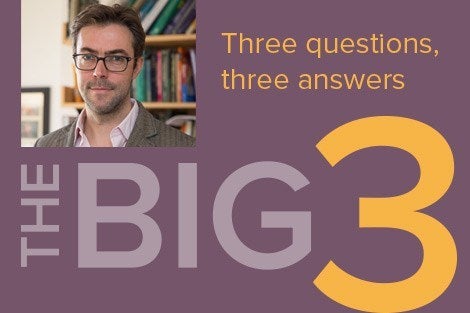January 7, 2021 – William Hanage, associate professor of epidemiology at Harvard T.H. Chan School of Public Health, discusses two newly discovered coronavirus variants.
Q: There are new reports of a second coronavirus variant in South Africa—in addition to the one found in the U.K. and other countries—that may have higher transmissibility than other strains. What can you tell us about these variants?
A: First let’s distinguish between “mutations” and “variants.” Mutations are specific changes in the viral genome. They happen all the time and most don’t make a big difference, or are actually bad for the virus. These variants, however, have multiple mutations that distinguish them from the rest of the virus population.
In the last few months, we’ve seen two variants emerge. The first “variant of concern” was reported from the U.K. and over the last few weeks evidence has accumulated that it is more transmissible. The second, the so-called “501.V2” variant, has been spreading rapidly in South Africa. Other countries have reported the presence of both variants which is likely a result of increased scrutiny and awareness. These two variants share some similarities, including a specific mutation leading to a change in the spike protein that has been found in vitro to enhance the coronavirus’ binding affinity to the receptor the virus uses to enter cells. In addition to this mutation, 501.V2 has multiple other mutations, including one that may help make the virus not as easily neutralized by convalescent sera, a treatment that uses blood obtained from an individual who has recovered from COVID-19 and developed antibodies.
Q: How likely do you think it is that there will be other variants emerging that have higher transmissibility, and how likely is it that any of these would wind up in the U.S.?
A: It should be noted that variants have not emerged in a predictable fashion and seem to arise rarely. We know of two at the moment, and there have been more than 85 million cases of coronavirus worldwide. However, given the uncontrolled nature of the pandemic in many places, it is extremely likely that other variants will emerge and reach the U.S. Indeed, they may have already done so and we have only seen the ones in the places people were looking for them.
Genomic surveillance is poor in most places, including much of the U.S. For example, when I recently looked on nextstrain.org—a website that tracks pathogen evolution and brings together genomic data from worldwide sources—and looked for SARS-CoV-2 genomes from North Dakota, I found none, even though North Dakota was 4th in the nation for per capita mortality at the time. It ought to be a scandal that we know so little about the virus circulating there.
Q: How confident can we be that the currently available vaccines will be effective against any new variants? And what would be the most important strategies to avoid the rapid spread of these variants?
A: At present we don’t have any evidence that there will be diminished efficacy of the available vaccines. The variant of concern reported in the U.K. does not appear more likely to reinfect those who we know were previously infected, which suggests vaccines will be effective. 501.V2 does have some mutations that have been reported elsewhere to evade elements of the immune response, but it is not clear whether its success is related to this or higher infectiousness. It is important to note that vaccines work with multiple parts of the immune system, and so even if one is diminished, the others should still be active.
In the meantime, to avoid the spread of these variants, we should make sure we know where they are and be ready to respond. Then we must be prepared to enact stronger restrictions. It’s worth noting that in the U.K. the variant became very common in the South East of the country in November, a period when relatively severe restrictions were in place. Finally, we need to vaccinate. All that astonishing scientific work to produce the vaccines counts for nothing if we don’t overcome distribution issues and get people to take them.
